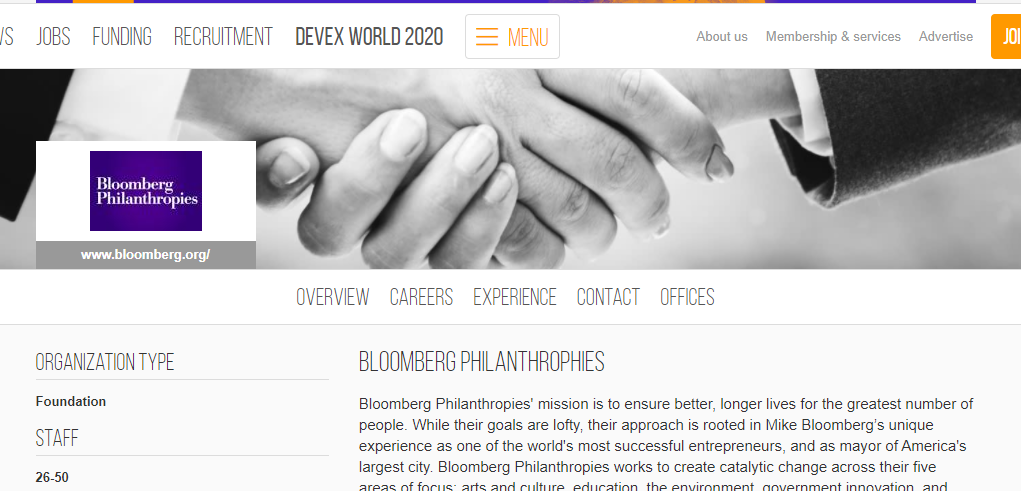A number of public health and tobacco harm reduction organizations and experts have since spoke up against these claims. “This UK study used highly inaccurate and unfair descriptions that undermined the quality of the research and the reputation of the University of Bath. From as far away as New Zealand, we’ve raised concerns over the speculative method it employed without using any scientific evidence in labelling tobacco harm reduction advocates,” said Nancy Loucas, Executive Director for CAPHRA (Coalition of Asia-Pacific Tobacco Harm Reduction Advocates).
The researchers failed to apply any scientific method to their assumptions
Loucas pointed out that the TCRG’s own website confirms the funding from Bloomberg Philanthropies, the infamous influential multi-billion-dollar group that is a leader the movement against tobacco harm reduction products. “Michael Bloomberg is on record saying vaping should be banned, and the major recipients of his money fail to distinguish between products based on relative risks and thus end up protecting cigarettes by attacking low-risk alternatives.”
She added that the Bath study contains all manner of allegations about who funds whom and for what, yet the researchers clearly did not verify their claims by going through the websites of the mentioned organisations, neither did they apply any scientific method in their assumptions.
“When doing research, following the scientific method, you have a hypothesis (question) that you are going to investigate—in this case: Does the group have any financial connection to funds from big tobacco? The next step in the process is to develop a method to test your hypothesis—in this case, either looking at its financials which are publicly available on the charities commission website or asking someone directly about it,” said Loucas.
“After you have chosen your method, you gather evidence, make an objective analysis, and state your findings to make a conclusion. Your method should be thorough and your research should be objective in order to maintain the integrity of your research (and yourself). The evidence will either prove/disprove your original hypothesis. Obviously that didn’t happen,” she added.
“The speculative method employed by Bath researchers has no place in any scientific study, which should make readers question any of the findings that are produced by those who choose to play such games. This is sadly a blatant attempt to rob consumers of their voice so that the Bloomberg network, which the authors belong to, can keep influencing governments to impose bans on lower-risk alternatives which could have helped address the tobacco-related health crisis.”
Bloomberg Philanthropies pushes for the proven unsuccessful abstinence-only smoking cessation method
Concurring with Loucas, public health policy expert David Sweanor, an adjunct professor of law at the University of Ottawa, said funding from bodies such as Bloomberg Philanthropies, that insist on the proven unsuccessful abstinence-only smoking cessation method, should raise obvious concerns.
“Michael Bloomberg is on record saying vaping should be banned, and the major recipients of his money fail to distinguish between products based on relative risks and thus end up protecting cigarettes by attacking low-risk alternatives,” he said. “While groups are hungry for funding, they should also be aware of the corrupting influence of sources with an unscientific, irrational and inhumane agenda.”
Harm reduction groups falsely accused of being affiliated with Big Tobacco
The Association of Vapers India (AVI), which advocates for less harmful alternatives was one of the organizations attacked directly, and has written to the journal raising objections over being labelled as a tobacco industry front group, when infact their objective is being the opposite. “We have written to the journal raising objections over casting us as a tobacco industry front group without any evidence and by drawing unfair inferences from our membership of International Network of Nicotine Consumer Organisations (INCCO),” AVI director Jagannath Sarangapani said in response to the name-tagging by the University of Bath researchers.
The AVI was actually formed in 2016 as a result of protests by local vapers who were struggling due to the wave on e-cig bans that had started spreading across India. “AVI is an independent, consumer-run organization with no financial ties to INNCO, the Foundation for Smoke-free World (FSFW) or the tobacco industry,” Sarangapani said.
“Such accusations are hence blatant attempts to rob consumers of their voice so that the Bloomberg network, which the authors belong to, can keep influencing governments to impose bans on lower-risk alternatives which could have helped address the tobacco-related health crisis, especially in low-income countries where people cannot afford medical treatments to deal with the consequences of tobacco use and hence harm prevention is a key measure,” added Sarangapani.
The Bloomberg grant has prejudiced the quality of research conducted by the University of Bath’s TCRG
In August 2018, the University of Bath made a major funding announcement that put Bath TCRG at the center of a new $20-million global industry watchdog. “With significant funding from Bloomberg Philanthropies, our Tobacco Control Research Group will spearhead a brand new global tobacco industry watchdog,” it said.
Consumer groups said the funding from Bloomberg Philanthropies has not only prejudiced the quality of research work of University of Bath’s TCRG, but also made it a mouthpiece of Bloomberg, an organization that wants to ban smoke-free products while rejecting calls to outlaw cigarette smoking.













